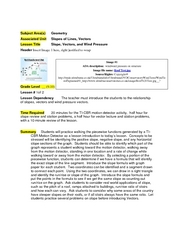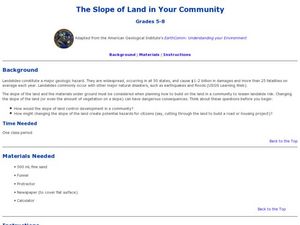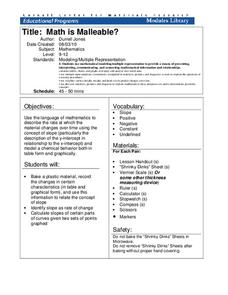University of Wisconsin
Measuring Slope for Rain Gardens
The slope of the land is an important feature when considering the erosion that will occur. In this resource, which is part of a rain garden unit, learners calculate the slope of the proposed garden site. Even if you are not planning a...
Curated OER
Slope, Vectors, and Wind Pressure
A hands-on lesson using the TI-CBR Motion Detector to provide information to graph and analyze. The class uses this information to calculate the slope of motion graphs and differentiate scalar and vector quantities. There is a real-world...
Nevada Outdoor School
Let It Snow! Let It Melt!
Winter weather offers a great opportunity to teach young scientists about the states of matter. This activity-based lesson includes a range of learning experiences, from experimenting with the rate at which ice melts...
Curated OER
The Slope of Land in Your Community
Learners participate in finding the slope of a sand pile and then other materials. In this geology lesson, students describe what happens to the piles of materials when they are poured through a funnel. Learners measure the slope using a...
Cornell University
Math Is Malleable?
Learn about polymers while playing with shrinky dinks. Young scholars create a shrinky dink design, bake it, and then record the area, volume, and thickness over time. They model the data using a graph and highlight the key features of...
Curated OER
Velocity and Acceleration
Compliment your physics lesson with this PowerPoint which demonstrates many important points regarding acceleration and velocity. A starter experiment activity to stimulate student thinking is given, and may prove very interesting to a...
Curated OER
Friction - Slip or Stick
In this friction instructional activity, learners complete a friction experiment in which they use marbles to create friction between a book and a tin. This instructional activity contains equipment, preparation, background information...
Curated OER
The Living Earth
Students discuss glaciers and write a definition for a glacier as a class. After discussion, they participate in an activity that demonstrates how glaciers can cause dramatic changes and create new landforms. Groups discuss their...
Curated OER
Geography: examining the Glacial Features of Cape Cod
Students examine satellite images of the glacial features of Cape Cod. They analyze where human activity is located in terms of those features. Students make models of the features, including kettle holes. They also use contour maps...
Michigan Sea Grant
Exploring Watersheds
Collaboratively, students partake in a hands-on activity in which they build models of a watershed. Each group member draws an elevation map—a bird's eye view—of their model and predicts how water will flow from the high to low points....
National Council of Teachers of Mathematics
Varying Motion
For this secondary mathematics learning exercise, high schoolers collect data based on a person’s motion. From this data, learners create graphs comparing displacement, velocity, and acceleration to time. The five-page learning exercise...
Curated OER
Slip Slide'n Away
Young scholars analyze the sliding of boxes along a warehouse floor. In this algebra lesson, students connect math and physics by calculating the friction created by the sliding of each box. They develop faster method to move the box,...
Center Science Education
Model a Moving Glacier
Glaciologists in your class make models of glaciers to simulate how they move down a valley, and then they use it to test any aspect of glacier movement. Not only is this a vivid visual of how these monsters of ice flow, but it is also...
Curated OER
Getting Help, but for More Work?
Fifth graders discuss prior knowledge of slope and force. They relate steepness of slope to the force needed to get an object up the slope. Students read from their text the information about inclined planes. They answer the questions...
Curated OER
Ohm's Law
Students explain the meaning of Ohm's Law, and plot a graph of voltage versus current, by explaining how the slope is the resistance of the circuit.
Curated OER
I'm Inclined to See
Pupils examine motion of a sphere on an inclined plane. In this inclined plane lesson students complete an activity to discover basic relationships.
Curated OER
Where is Sophie?
Students use GPS to scrutinize the movements of a grizzly bear named Sophie. They answer a series of questions like; where she forages, her zone of influence, and human interaction. They read the story of Sophie, the collared bear in...
Cornell University
Constructing and Visualizing Topographic Profiles
Militaries throughout history have used topography information to plan strategies, yet many pupils today don't understand it. Scholars use Legos and a contour gauge to understand how to construct and visualize topographic profiles. This...
Cornell University
Mechanical Properties of Gummy Worms
Learners won't have to squirm when asked the facts after completing an intriguing lab investigation! Hook young scholars on science by challenging them to verify Hooke's Law using a gummy worm. Measuring the length of the worm as they...
Curated OER
It'll Go With the Flow...
Students construct a water table elevation contour map and consider the direction and rate of groundwater flow to predict the actual runoff pattern. They discuss their findings and evaluate a hypothetical landfill site based on data...
Curated OER
Ziplock Chemistry
Students investigate various chemical reactions when creating mixtures in ziplock baggies. In this chemistry lesson, students will recognize various chemical reactions and cite evidence. Safety and assessment strategies are included in...
Curated OER
Topographic Maps
In this topographic map worksheet, students learn how to read a topographic map and create a topographic map of their own using clay or Play-Doh. Students include contour lines by layering the clay. Students answer 6 questions about...
Curated OER
Understanding Watersheds
Students should learn how their actions on land can affect the water quality of lakes and rivers.























